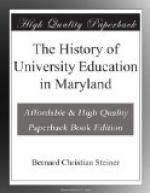1883 HERBERT B. ADAMS, Ph.D History. 1883 MAURICE BLOOMFIELD, Ph.D Sanskrit and Comp. Philology. 1883 WILLIAM K. BROOKS, Ph.D Animal Morphology. 1883 THOMAS CRAIG, Ph.D Mathematics. 1883 CHARLES S. HASTINGS, Ph.D Physics. 1883 HARMON N. MORSE, Ph.D Chemistry. 1883 WILLIAM E. STORY, Ph.D Mathematics. 1883 MINTON WARREN, Ph.D Latin. 1884 A. MARSHALL ELLIOT, Ph.D Romance Languages. 1884 J. RENDEL HARRIS, A.M New Testament Greek. 1885 GEORGE H. EMMOTT, A.M Logic. 1885 C. RENE GREGORY, Ph.D New Testament Greek. 1885 GEORGE H. WILLIAMS, Ph.D Inorganic Geology. 1885 HENRY WOOD, Ph.D German. 1887 RICHARD T. ELY, Ph.D Political Economy. 1888 WILLIAM T. COUNCILMAN, M.D Anatomy. 1888 WILLIAM H. HOWELL, Ph.D Animal Physiology. 1888 ARTHUR L. KIMBALL, Ph.D Physics. 1888 EDWARD H. SPIEKER, Ph.D Greek and Latin. 1889 Louis DUNCAN, Ph.D Electricity. 1889 FABIAN FRANKLIN, Ph.D Mathematics.
At the opening of the Johns Hopkins Hospital, the principal physicians and surgeons of that foundation were appointed professors of the University, namely, arranged in the order of their appointment:
1889 WILLIAM OSLER, M.D Medicine. 1889 HENRY M. HURD, M.D Psychiatry. 1889 HOWARD A. KELLY, M.D Gynecology. 1889 WILLIAM S. HALSTED, M.D Surgery.
In selecting a staff of teachers, the Trustees have endeavored to consider especially the devotion of the candidate to some particular line of study and the certainty of his eminence in that specialty; the power to pursue independent and original investigation, and to inspire the young with enthusiasm for study and research; the willingness to cooeperate in building up a new institution; and the freedom from tendencies toward ecclesiastical or sectional controversies. They announced that they would not be governed by denominational or geographical considerations in the appointment of any teacher; but would endeavor to select the best person whose services they could secure in the position to be filled,—irrespective of the place where he was born, or the college in which he was trained, or the religious body with which he might be enrolled.
It is obvious that in addition to the qualifications above mentioned, regard has always been paid to those personal characteristics which cannot be rigorously defined, but which cannot be overlooked if the ethical as well as the intellectual character of a professorial station is considered, and if the social relations of a teacher to his colleagues, his pupils, and their friends, are to be harmoniously maintained. The professor in a university teaches as much by his example as by his precepts.




